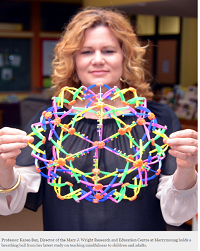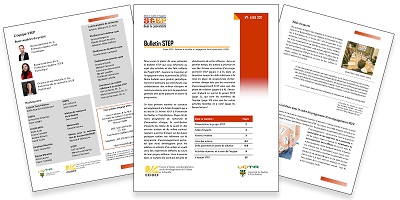Bulletin 5

NEWS FROM THE HUB
Welcome to Issue 5 of the Knowledge Hub Bulletin!
March 2017 Knowledge Exchange
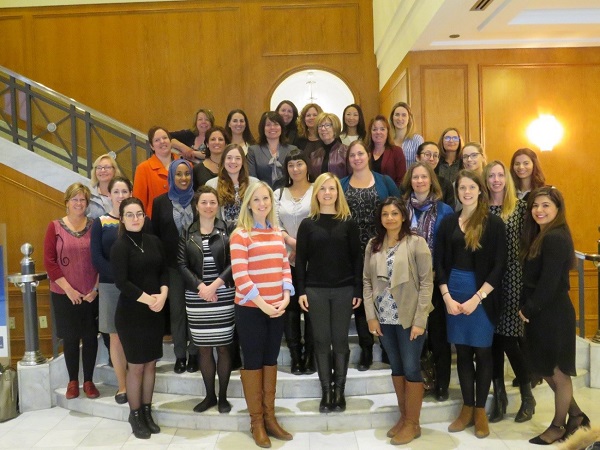
Photo: Members of the Trauma- and Violence-Informed Health Promotion Community of Practice at the March 2017 Knowledge Exchange in Toronto, Ontario.
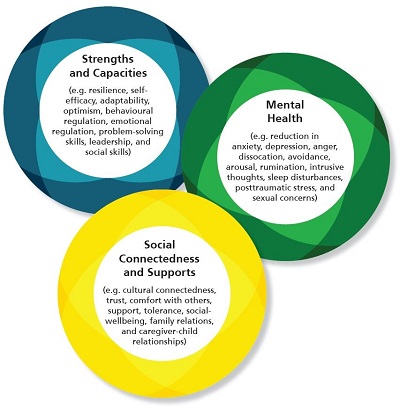 The Hub facilitated a Knowledge Exchange for the Trauma- and Violence-Informed Community of Practice on March 20-21, 2017 in Toronto. Discussions focused on reviewing proposed common outcome indicators among projects, issues related to trauma- and violence-informed research and practice, and preliminary lessons learned from stage-related project challenges and solutions.
The Hub facilitated a Knowledge Exchange for the Trauma- and Violence-Informed Community of Practice on March 20-21, 2017 in Toronto. Discussions focused on reviewing proposed common outcome indicators among projects, issues related to trauma- and violence-informed research and practice, and preliminary lessons learned from stage-related project challenges and solutions.
The common outcomes identified by projects funded under the Public Health Agency of Canada’s investment, “Supporting the Health of Victims of Domestic Violence and Child Abuse through Community Programs” are:
- Strengths and Capacities
- Mental Health
- Social Connectedness and Supports
The Knowledge Exchange report offers a summary of discussions and lessons learned to date from the Trauma- and Violence Informed Health Promotion Community of Practice members.
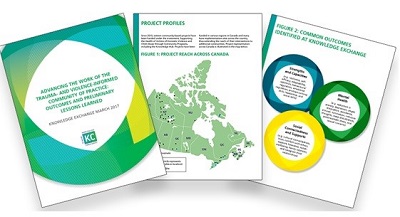
Sharing Successes
The Building Connections project is currently disseminating its interpersonal violence intervention to select Community Action Program for Children (CAPC), Canada Prenatal Nutrition Program (CPNP), and Aboriginal Head Start in Urban and Northern Communities (AHSUNC) sites in Campbell River, Terrace, Yellowknife, Sioux Lookout, Sault Ste. Marie, Lanark County, Ottawa, Toronto and Waterloo. Project team members are excited about the new relationships and connections they are establishing when engaging with these sites.
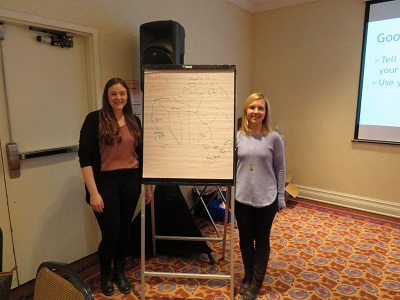
Photo (L-R): Naomi Andrews and Mary Motz
The MindUP program is being embedded in the curriculum in select schools in London, ON. Children are taught the science behind how the brain influences their thinking, emotions and behaviours. The more children learn about their brains, the more neuro-connections are made and the more power they gain to make more mindful choices.
Project team members are excited about the positive feedback they have been receiving from the teachers, children and social workers involved in the program.
The following email was sent to MindUP project team members from one of the teachers involved in the program:
“I have to tell you yesterday I had the students watch the movie "Inside Out" because it was the last Friday before the break and it relates to the brain. I had to stop the movie when I heard the kids talking about how the pre-frontal cortex was working with the hippocampus at one point in the movie. I also had a parent send me a note thanking me for teaching their child about the brain because he is talking about it all the time at home. I am really enjoying teaching and seeing the students engage in this.”- Teacher
On April 11, 2017, MindUP held a booster training for the teachers, early childhood educators, educational assistants, social workers, and principals who are involved in the pilot at the LDCSB Catholic Education Centre. Following the booster training session, one teacher said, “I think it is so important to emphasize that MindUp benefits the students, BUT ALSO the teachers involved!! I know that this program has helped me personally deal with stress in my life, remain positive and help me to be more present in the moment. It is a beautiful way of being!”
Learn more about the MindUP program in this Western Education news article.
Nato’ we ho win (Cree for “the art of self-healing”), a trauma- and-violence-informed artistic and cultural group, offers Indigenous women who have experienced intimate partner violence the opportunity to participate in cultural arts-based activities, hear traditional teachings, and practice self-care in a trauma- and violence-informed group environment. The program is facilitated by an individual who is skilled in the transmission of cultural teachings, as well as in the facilitation of arts-based activities. An Elder and a Domestic Violence Advocate are available at each group session to provide additional support, counselling, or assistance with safety planning.
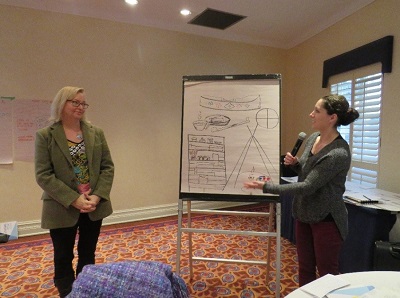
Photo (L-R): Jo-Anne Dusel and Crystal Giesbrecht
Currently, Nato’ we ho win is being piloted in Moose Jaw, Saskatchewan where participants have been beading using looms. In September 2017, Nato’ we ho win will be offered in three communities in Saskatchewan: Moose Jaw, Prince Albert, and Regina. Other creative activities including journaling, sewing and painting will be incorporated into subsequent groups.
The research team and pilot group had the privilege to attend the Royal Saskatchewan Museum Archives, where they viewed and photographed artifacts, including loomwork that had been created by Indigenous women in Saskatchewan. These photos are being used by Nato’ we ho win participants as examples of patterns for replication in their own beadwork projects.
Photos courtesy of Nato’ we ho win project
Trauma-Informed Sport Program at Boys and Girls Clubs of Canada
Boys and Girls Clubs of Canada, in collaboration with Edgework Consulting, is nearing completion of the program development phase of the project. A train-the trainer methodology is being implemented to assist with transfer of learning to additional Boys and Girls Clubs of Canada organizations. Training of local trainers and master trainers will commence in September 2017 at three Boys and Girls Clubs of Canada sites. Beta testing of the program will be conducted this summer.
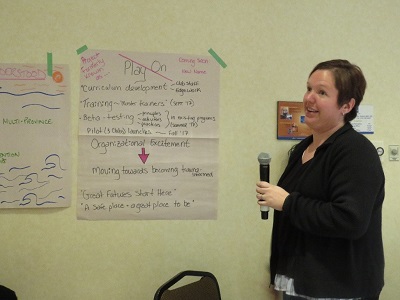
Photo: Janath Vesna
Supporting Victims and Strengthening the Health of Northern and Indigenous Youth Experiencing Teen Dating Violence in the Northwest Territories
FOXY and SMASH use drama, visual arts, moose hide beading, traditional hand drumming, photography, digital storytelling, and music to educate and facilitate discussions regarding issues that affect Northern youth, including violence, relationships, sexual health, and mental health. FOXY held a Trauma Training Workshop and Think Tank in Yellowknife from February 28th to March 4th for 17 adults and 44 youth from 15 communities across the Northwest Territories. The Think Tank offered youth the opportunity to provide input on effective ways to help reduce teen dating violence in the NWT. FOXY has made several significant revisions and additions to their programming based on the input of attendees. One recommendation adopted is the inclusion of trauma-informed principles in the organization’s policies and procedures manual.
Building Internal Resilience through Horses
Building Internal Resilience through Horses project has received positive feedback from participants since the launch of its first group on March 7, 2017. The project has successfully started three groups all of which have had perfect attendance so far. The program is and continues to generate high interest among young women aged 13 to 18 across the Kawartha region. The horse farm is located in Otonabee Township near Rice Lake and the program received referrals from people living outside of the farm area. Transportation is provided to participants when needed. Participants are excited to be involved in a program that does not require disclosure and trauma-processing through traditional talk therapy.
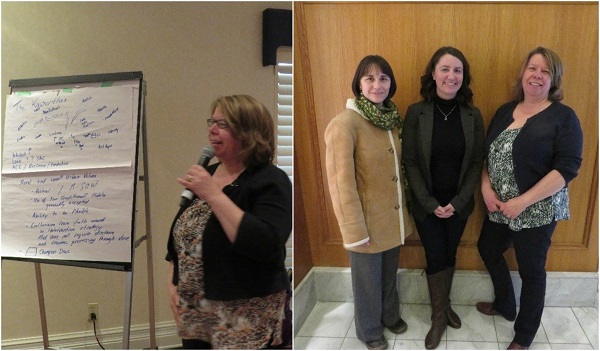
Photo (Left): Sonya Vellenga
Photo (Right) (L-R) Kateryna Keefer, Katie McKeiver, and Sonya Vellenga
P.E.A.C.E. Project (Peer Education, and Connection through Empowerment)
This project seeks to improve resiliency and promote healthy outcomes for girls and women who have experienced gender-based violence (GBV). Weekly groups are facilitated by peer mentors with support from the project’s health promotion coordinator and volunteers. The project launched its first group in late January 2017 with 17 participants. A third group recently began in April.
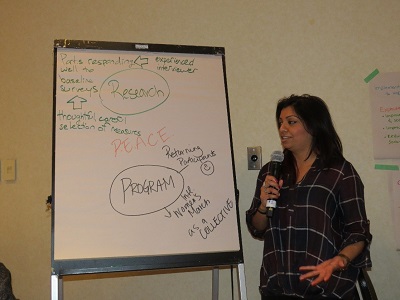
Photo: Rizani Razeed
Featured Resources
STEP: Soutenir la transition et l’engagement dans la parentalité| Supporting the transition to and engagement in parenthood in adults who experienced maltreatment as children
STEP is pleased to announce the release of its first bulletin! STEP’s Bulletin will be produced periodically with updates on the project’s progress. This first issue is focused on the expert panel meeting held on February 21, 2017 at the Université du Québec à Trois-Rivières.
Reclaiming Our Spirits (ROS) is a health promotion intervention designed for Indigenous women living in an urban context in Canada. Building on a theory-based health promotion intervention (iHEAL) showing promising results in feasibility studies, ROS was developed using a series of related approaches. Information about this initiative is available in the article and video links below:
Varcoe, C., Browne, A. J., Ford-Gilboe, M., Stout, M. D., Mckenzie, H., Price, R., Bungay, V., Smye, V., Inyallie, J., Day, L., Khan, K., Heino, A., Heino, A., Merritt-Gray, M. (2017). Reclaiming Our Spirits: Development and Pilot Testing of a Health Promotion Intervention for Indigenous Women Who Have Experienced Intimate Partner Violence. Research in Nursing & Health. doi:10.1002/nur.21795
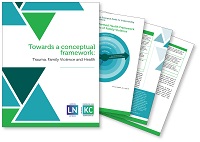 A literature review summarizing the potential health outcomes of child maltreatment and intimate partner violence
A literature review summarizing the potential health outcomes of child maltreatment and intimate partner violence
Baker, L., Straatman, A.L., Etherington, N., O’Neil, B., Heron, C., Sapardanis, K. (2016). Towards a conceptual framework: Trauma, Family Violence and Health. London, ON: Knowledge Hub, Learning Network, Centre for Research & Education on Violence against Women & Children.
French PDF
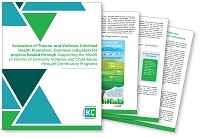 This report details the process and rationale for identifying three common outcomes and potential associated indicators for evaluating the investment across projects.
This report details the process and rationale for identifying three common outcomes and potential associated indicators for evaluating the investment across projects.
Straatman, A.L., Baker, L., Tabibi, J., Mohamed, S. (2017). Evaluation of Trauma-and Violence-Informed Health Promotion: Common indicators for projects funded through Supporting the health of victims of domestic violence and child abuse through community programs. London, ON: Knowledge Hub, Centre for Research & Education on Violence against Women & Children.
French PDF
Upcoming Webinars
 Trauma-Informed Practice with Indigenous Peoples across the Life Span
Trauma-Informed Practice with Indigenous Peoples across the Life Span
Date & Time: May 16, 2017 | 1:00 to 2:15 PM Eastern Standard Time
Presented by: Natalie Clark, Associate Professor, School of Social Work and Human Service, Thompson River University
Professor Clark will examine the beginnings of a trauma practice framework that is Indigenous, intersectional and holistic and that considers how experiences of trauma and of healing are shaped by the interlocking impact of Indigeneity, age, gender, sexuality, and (dis) ability, among others. She will discuss Indigenous intersectional, trauma-informed and culturally safe practice approaches with people of different age groups to assist Indigenous peoples in understanding and improving their coping responses.
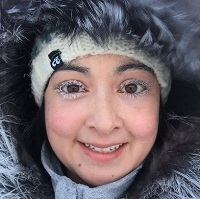 Conducting Research with Indigenous Populations
Conducting Research with Indigenous Populations
Date & Time: June 6, 2017 1:00 to 2:15 PM Eastern Standard Time
Presented by: Gwen Healey, Executive and Scientific Director, Qaujigiartiit Health Research Centre, Iqaluit.
There is a growing awareness that Indigenous knowledge must be perceived, collected, and shared in ways that are unique to and shaped by the communities and individuals from which this knowledge is gathered. In this webinar, Dr. Healey will offer a model based on Inuit perspectives on health-related research epistemologies and methodologies to inform research. In particular, webinar participants will be introduced to the Piliriqatigiinniq Community Health Research Model rooted in Inuit concepts and perspectives on health, wellness, and research. This approach may inspire other communities to develop similar frameworks.
Webinar Library
Reaching Youth through Sports: Trauma-Informed Physical Activity
Date: March 7, 2017
Presented by: Rebekah Roulier, Chief Operating Officer, Doc Wayne
What it takes to be a Trauma-informed Organization
Date: January 31, 2017
Presented by: Holly Murphy, Advanced Practice Leader for Trauma Informed Care, the IWK Health Center and Sue McWilliam, Advanced Practice Leader for Outcomes & Evaluation Research, IWK Health Centre.
From Trauma-informed to trauma-and violence-informed
Date: November 29, 2016
Presented by: Colleen Varcoe, Professor, University of British Columbia
Knowledge Hub Team
Linda Baker, Sara Mohamed, Anna-Lee Straatman, Jassamine Tabibi
We would love to hear from you!
Contact us: smoha84@uwo.ca
Check us out on social media:
Facebook: facebook.com/TheLearningNetwork
Twitter: twitter.com/learntoendabuse
